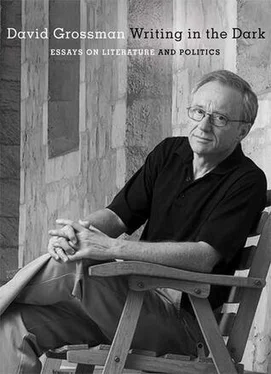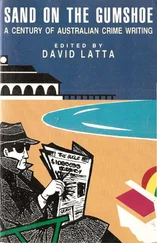To me, it is a book about the birth of an artist from within those “fortressed walls of tedium.” Aron, who is twelve when the story begins, a bright and imaginative child with abundant happiness, feels this invasion increasingly stifling him. It is all around him, shoving rude fingers into his mind and body. Even the physiological process of maturation that he faces seems to be a part of it. (Incidentally, the Hebrew words for “muscle”— shrir —and “arbitrariness”— shrirut —come from the same root.)
Alienation and, ultimately, hostility emerge between Aron and his own flesh and body — between himself and the part of his being that has an external, objective, yet extremely internal existence. Aron sees his friends begin to mature and change, as if collectively obeying an invisible order, and he is incapable of joining them. There is something in the unity of the process, in its inevitability, that deters him because he finds it lacking in freedom, almost humiliating.
Aron’s case is of course an extreme one, but I imagine we all remember the feelings of our adolescence, when we entered a tunnel that would stretch out for a number of years without knowing what fate had in store for us, how we would emerge at the other end, woven into which body, woven into which soul. As the years go by, we come to know the thing that Aron feared most, unknowingly of course, and which probably made him refuse to accept this constitution of the flesh: the knowledge of how easy it is for the mind to surrender to the corporeal dimension and gradually become a mechanism much like that of the body — with clogged arteries, cramped muscles, rigid joints, and automatic reflexes.
Faced with the bureaucracy of the body imposed on him, Aron feels that the primary means through which he can express his freedom, his uniqueness, and even his sexuality is language. And since language is also a kind of body, with a dual existence, both inside and out, Aron is tormented every time there is a grating contact between that “inside” and that “outside”: when people around him use language like old saws, when they belittle something that in Aron’s soul has a different, purer, more loyal existence. From that particular moment he realizes instinctively that he can no longer use words as others do — indiscriminately, indifferently, inarticulately.
It is also relevant to note that the story occurs shortly before the Six-Day War, when everyone Aron meets talks in the same blunt, military style, born of fear and arrogance. They all prophesize in the same tone, and this depresses Aron to no end, both because of the crudeness that characterizes the uniform, slogan-ridden discourse and because of his sense that they all belong to a secret, hermetic system of symbols from which he himself is removed, and that he will never have the requisite crudeness or obtuseness to become a part of it.
Deep within himself, beneath his heart, Aron establishes a hospital for sick words, where he employs complex rituals to heal and purify the words he gathers from the day-to-day. Only when the purification process is complete does he feel entitled to use the words. They have passed through his body and soul. They are his. Of course this process condemns Aron to utter solitude, trapped in his inner world, in his own private language, creating his beloved and his best friend inside himself, unable to maintain normal relationships with them in what is termed “reality.” The book ends when Aron shuts himself up inside an old refrigerator and hopes that with the help of the childlike, artistic spark he used to have, he will be able to pull off his most difficult Houdini trick and break out of the refrigerator into the world. But will he in fact be able to?
I have my own answer to this question, but before I reach it I would like to shift from the private, personal language to the more general kind, which served as a sort of “inspiration in reverse” for three of my books: the novel The Smile of the Lamb and two works of nonfiction, The Yellow Wind and Sleeping on a Wire . Each of these books, in its own way, tries to describe contemporary political reality in a language that is not the public, general, nationalized idiom.
To our great misfortune, we in Israel have been living for almost a century in a state of violent conflict, which has an enormous influence on all realms of life, including, of course, on language. When a country or a society finds itself — no matter for what reasons — in a prolonged state of incongruity between its founding values and its political circumstances, a rift can emerge between the society and its identity, between the society and its “inner voice.” The more complex and contradictory the situation becomes and the more the society has to compromise in order to contain all its disparities, the more it creates a different system for itself, an ad hoc system of norms, of “emergency values,” keeping double books of its identity.
I am not saying anything new here. Those who live in such a reality, as we do in Israel, will find it easy to understand how fears consolidate ideals around themselves, how needs become values, and how a subjective world-view and a self-image that is wholly unsuited to reality can materialize. A special kind of language then begins to emerge, one that is usually a manipulation on the part of those who wish to prolong the distorted situation. It is a language of words intended not to describe reality but to obfuscate it, to allay it. It depicts a reality that does not exist, an imaginary state constructed by wishful thinking, while large and complex elements of the actual reality remain wordless, in the hope that they will somehow fade away and vanish. In such conditions one of our most dubious talents arises: the talent for passivity, for self-erasure, for reducing the inner surface of our soul lest it get hurt. In other words, the talent for being a victim.
Let us go back eleven years, to the spring of 1987.
For two decades, as a result of the Six-Day War, Israel has controlled more than two million Palestinians. By all opinions this is a grave state of affairs, yet it turns out that most Israelis, as well as most Palestinians, have taught themselves how to live in these warped circumstances and that many of them believe the situation will never change. As time goes by, there is an increasing perception of a “status quo,” along with more and more arguments that justify and even sanctify this very status quo. The press provides scarcely any news of what is going on in the Territories, only brief reports of violent incidents phrased in fixed formulas that are little more than slogans and do not catch one’s eye for very long.
At this time I was working as a newscaster on the Kol Israel radio news. I was given dozens, if not hundreds, of items to read that sounded something like this: “A local youth was killed during disturbances in the Territories.” Notice the shrewdness of the sentence: “disturbances”—as if there were some order or normative state in the Territories that was briefly disturbed; “in the Territories”—we would never expressly say “the Occupied Territories”; “youth”—this youth might have been a three-year-old boy, and of course he never had a name; “local”—so as not to say “Palestinian,” which would imply someone with a clear national identity; and above all, note the verb “was killed”—no one killed him. It would have been almost intolerable to admit that our hands spilled this blood, and so he “was killed.” (Sometimes the passive voice is the last refuge of the patriot.)
Because we lost the capacity to use the right words to describe reality, we woke up one day, in December 1987, to a reality that is difficult to describe. Israel had deceived itself so efficiently that the Israel Defense Forces did not even have contingency plans to deal with the mass protests. At the beginning of the intifada the security apparatus dispatched urgent envoys to the world’s most dubious markets to purchase rubber bullets, gravel-spraying vehicles, and other necessities. Yet any country that occupies and oppresses another people must be prepared for such large-scale demonstrations. Israel was not prepared, because it did not know it was an occupier, it did not think it was an oppressor, and it did not tell itself that there was a people out there.
Читать дальше












